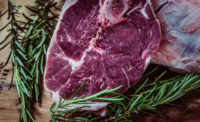USMEF conference details Farm Bill challenges and examines importance of U.S.-Mexico trade relations
The current Farm Bill is set to expire Sept. 30.

Courtesy of the US Meat Export Federation
The U.S. Meat Export Federation (USMEF) Spring Conference recently concluded in Minneapolis with insights from former House Agriculture Committee Chairman Collin Peterson on how to make international trade a higher priority in the next Farm Bill.
Peterson, who oversaw the development of four Farm Bills during his 30 years in Congress, said trade has too often taken a back seat in Farm Bill debate and messaging.
 Former House Ag Committee Chairman Collin Peterson discusses importance of prioritizing trade issues in the next Farm Bill. Photo courtesy of USMEF.
Former House Ag Committee Chairman Collin Peterson discusses importance of prioritizing trade issues in the next Farm Bill. Photo courtesy of USMEF.
“For those of you that have members of Congress in your area who are on the Ag Committee, start talking to them about trade,” Peterson said. “I used to meet with everyone from my district who came to discuss the Farm Bill. They would talk about crop insurance, Title One, conservation and rural development. And at the end of the meeting they would say, ‘Oh by the way, we have to do something about trade.’ It should be the first thing you talk to them about, not the last thing. That way you can get some people to the table who will put trade at the top of the agenda, not the bottom, and that’s what needs to happen.”
With the current Farm Bill set to expire Sept. 30, Peterson said a one-year extension is likely. But he noted that if work requirements for those receiving nutrition assistance are included in negotiations on raising the debt ceiling, this could help accelerate the Farm Bill debate.
“And I think if that gets handled in the debt ceiling, however they handle it, and people get a chance to vote on it, that’s probably the most important thing that could happen to help get the Farm Bill passed,” he explained.
Peterson also emphasized the importance of animal health programs and foreign animal disease prevention, because outbreaks can have a devastating impact on trade.
“This is one of the most important issues we need to focus on,” he said. “When I worry about trade, I worry about this stuff coming back to bite us.”
 Kenneth Smith Ramos, former chief NAFTA negotiator for Mexico, stresses the critical role free trade has played in bolstering food security in North America. Photo courtesy of USMEF.
Kenneth Smith Ramos, former chief NAFTA negotiator for Mexico, stresses the critical role free trade has played in bolstering food security in North America. Photo courtesy of USMEF.
USMEF members received an update on U.S.-Mexico trade relations from Kenneth Smith Ramos, the former chief NAFTA negotiator for Mexico who played a key role in development and ratification of the U.S.-Mexico-Canada Agreement (USMCA). Now an international trade consultant, Smith detailed the critical importance of this trade relationship for both countries’ agricultural sectors.
“When the original NAFTA was negotiated there was a lot of nervousness, especially in Mexico, because of the full opening of agricultural trade for the first time,” he said. “But you fast-forward to where we are now, over half of what we export to the United States is in the area of fruits and vegetables, which we can grow year-round and that satisfies demand in the United States. Mexico imports grain, oilseeds and meat products from the U.S., taking advantage of the comparative and competitive advantages in both countries, and that is what has helped grow the overall agricultural trade pie over the years.”
Smith noted that while U.S. meat products already had duty-free access to Mexico under NAFTA, the development and passage of USMCA accomplished more than just maintaining the status quo.
“We were able to modernize the agreement with 12 new chapters that include disciplines that did not exist in 1992, or that needed to be adapted to today’s needs and the world economy,” he said. “In the sanitary and phytosanitary chapter, for example, there is a stronger emphasis on transparency and on science-based risk assessment. We were also able to eliminate proposals that looked to manage trade and do away with the complete opening of trade between our nations.”
Smith said that while agricultural goods generally flow smoothly between the U.S. and Mexico, the U.S. meat industry must be mindful of contentious issues — both agricultural and non-agricultural — that could disrupt trade. He also called on USMEF members to spread the message about the critical role of free trade in bolstering food security in the region.
“We must put food security at the top of the agenda so that our governments – especially in the case of the Mexican government – understand that this is not just an ‘ask’ from private sector companies that want to make a lot of money,” he explained. “Of course, that is what business is about and we want trade to generate economic opportunity. But the governments also need to understand that international trade – barrier-free trade – is how we are going to strengthen food security in the future.”
USMEF’s standing committees, which focus on issues specific to the organization’s pork, beef, exporter and feedgrains and oilseeds sectors, had meetings at the conference. The day before those meetings, conference attendees received an overview of market conditions in key destinations and examples of how USMEF’s chefs and other international staff members are working to showcase the value and versatility of underutilized pork, beef and lamb cuts. A recap of that day's program is available here.
USMEF members will next meet at the organization’s annual Strategic Planning Conference, set for Nov. 8–10 in New Orleans.
Source: U.S. Meat Export Federation
Looking for a reprint of this article?
From high-res PDFs to custom plaques, order your copy today!





